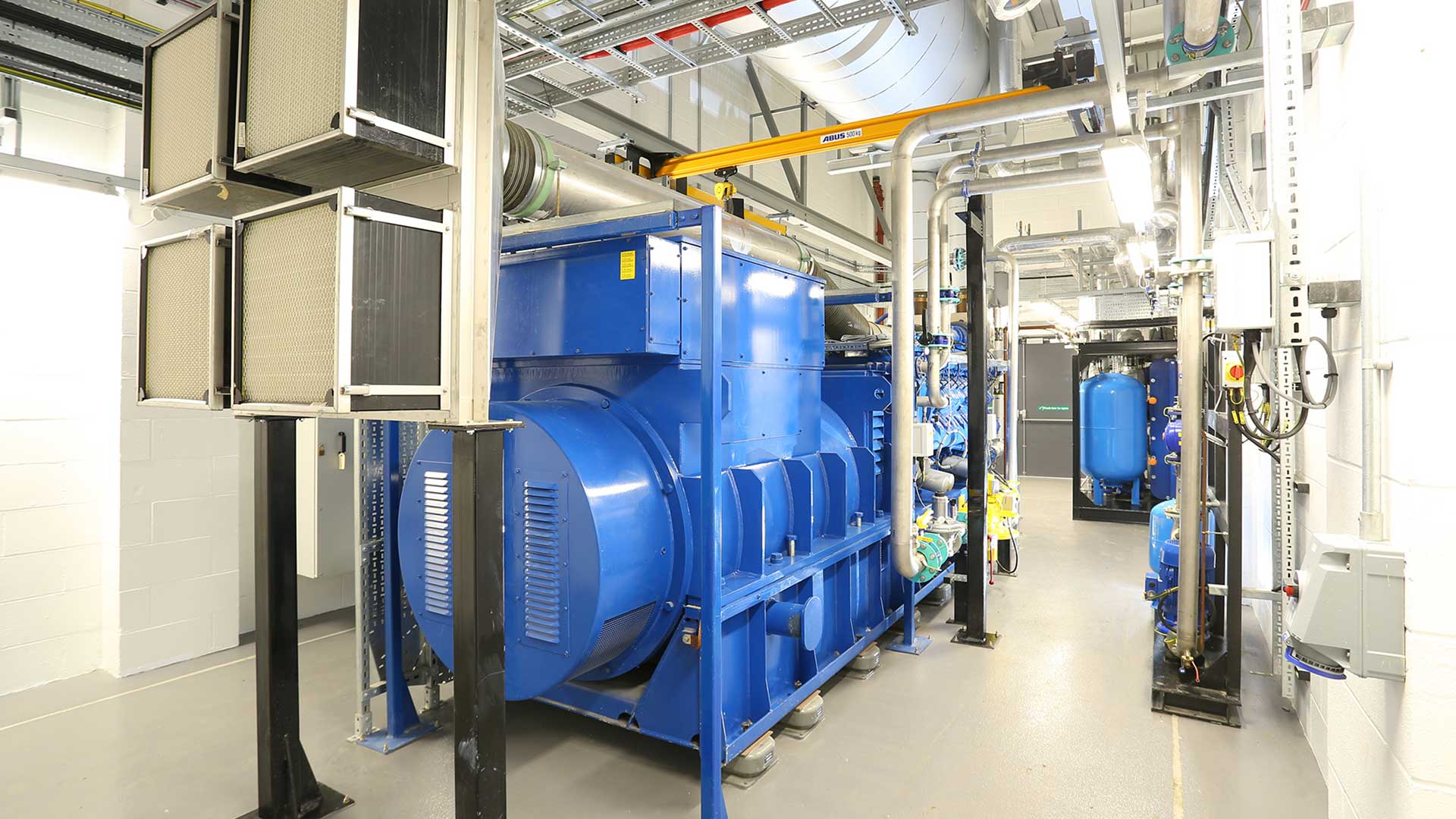
Combined Heat and Power (CHP) is a well-established technology that simultaneously generates electricity and heat from a single fuel input. As such, there are several key advantages and benefits of CHP over traditional power generation technologies and few challenges for commercial and industrial users to consider when looking to utilise CHP on-site.
Let’s examine these CHP advantages and potential challenges in detail.
Gas engines CHP can save up to 30% on primary energy costs when compared to the separate purchase of electricity from the electricity grid and gas for use in on-site boilers. With the soaring price of power, CHP is significant and will protect commercial and industrial users from further price increases.
CHP offers a typical return on investment between 2-3 years if correctly sized, installed, optimised, and maintained by a reputable and qualified CHP supplier, installer, and maintenance provider.
CHP plants certified as ‘Good Quality CHP’ under the Combined Heat and Power Quality Assurance (CHPQA) scheme can qualify for a range of financial incentives. These include exemptions from the Climate Change Levy, Annual Investment Allowance, and Business Rates.
An installed on-site CHP plant will offset some of the non-commodity costs associated with the energy bill and mitigate the risk posed by volatility in the market and fluctuating energy prices.
The power bill is made up of three expenses.
|
Year |
Wholesale Price % |
Non-Commodity Costs % |
|
2011 |
65% |
35% |
|
2021 |
35% |
65% |
|
2030 |
20% |
80% |
In 2011 non-commodity costs accounted for approx. 35% of the energy bill. Today, that figure is over 65% and the non-commodity cost is expected to rise to 80% within the next decade. For many businesses the cost of grid procured power could become financially unsustainable as power prices are expected to rise further in 2023. Therefore, measures should be put in place now to protect businesses from further escalating costs.
CHP can improve manufacturing productivity, manage energy costs, enable energy efficiency, improve infrastructure resilience, and protect long-term employment.
CHP is a proven technology and can deliver generation efficiencies up to 95% due to the high energy utilisation of a single fuel input. The electricity produced can be used for on-site use and heat recovered from the process is used for steam and hot water. If there is an on-site requirement for cooling and CO2 utilisation, then Trigeneration or Quadgeneration application should be considered. More on these applications below.
Where sites have low demand for heat but require cooling for process, an absorption chiller alongside the CHP known as Combined Cooling, Heat and Power (CCHP) or Trigeneration can produce temperatures as low as -5 degrees Celsius to deliver air conditioning cooling and refrigeration.
Should a horticultural glasshouse (greenhouse) grower or food and drinks processing plant (carbonation/bottling plant) require CO2 within their processes, then CO2 can be captured, scrubbed and utilised as an economical consideration.
Quadgeneration is a highly advanced gas engine configuration by which the CO2 is captured from the generation process and cleaned via selective catalytic reduction technology to provide high grade CO2. In application, Quadgeneration can promote crop yield in horticultural greenhouses and put the fizz in carbonated drinks.
Further power efficiencies are achieved because the cogenerated electricity and heat is produced and consumed on-site, avoiding the transmission and distribution losses of around 7.5% that occur in transporting electricity from remote generators to consumers.
CHP systems provide additional energy resilience by operating in parallel or entirely independently from the grid in Island Mode operation in the event of a power cut or mains failure. Also, where grid connections are constrained, CHP can support Commercial and Industrial users to generate their own power on-site thus ensuring security of power supply.
.jpg)
Most CHP plants operate using low carbon transitionary natural gas fuel and it is understood and according to industry research conducted by the Association of Decentralised Energy, CHP is expected to continue reducing emissions until 2030.
Whilst the carbon signature of CHP is reducing, gas reciprocating engines can accept hydrogen blends of up to 25% within the current gas network which will reduce site emissions further.
Gas engine CHP alongside additional renewable, energy storage and standby generation technologies can be configured as part of a microgrid application to operate independently from the local grid network in island mode operation or grid connected.
CHP can complement existing on-site technologies such as solar PV, energy storage, UPS, and Hydrotreated Vegetable Oil (HVO) fuelled standby diesel generation to further improve efficiencies and resilience, costs savings and asset flexibility as part of a colocated hybrid power solution.

Capital Purchase
Rental
Hire Purchase
Operating Lease
Power Purchase Agreements
Master Energy Service Agreements
Now that we have discussed the benefits, there are a few potential challenges when considering installing CHP at your site.
The initial capital outlay can be a barrier to entry for some commercial and industrial users, however, organisations with capital constraints or competing funding priorities can approach third party asset funders to finance the CHP project.
The decision to install CHP shouldn’t be determined solely by the capital investment and instead considered because of its suitability for your site requirements. Correctly installed, optimised, and maintained CHP plants have an operation lifespan between 10-15 years, yield a return on investment typically between 2-3 years and deliver impressive financial returns.
The financial and environmental benefits of CHP is truly realised when the CHP plant is optimised for a constant thermal or cooling (via absorption chilling) load requirement. By capturing and utilising the waste heat by-product, CHP becomes the most energy and fuel-efficient technology available.
CHP plants are fuelled typically by low carbon natural gas. Although natural gas is the cleanest of fossil fuels, its perceived negative connotation somewhat deters commercial and industrial users in favour of a 100% renewable solution. Users looking for a renewable CHP solution can use biogas or sewage gas should supplies be available.
Alternatively, purchasing biomethane or green gas via the Green Gas Certification Scheme (GGCS) ensures the authenticity and certification of the purchased green gas from legitimate producers. Whilst purchasing green gas will add additional cost to the project, it can reduce your site carbon emissions, form part of your sustainability, and support local gas producers and the local economy.
Lastly, hydrogen is a future fuel. According to the Energy Networks Association, the UK gas networks will start injecting 20% hydrogen volume into homes and businesses by 2023.
Current reciprocating gas engines are capable of 25% hydrogen blends and manufacturers are enabling their technology to operate on 100% pure hydrogen to secure future investment and maintain CHP as a viable technology during and post-transition.
Whether your business is sustainably led or financially driven, the current impact of rising power prices is placing an unsustainable cost burden and significantly impacting operational costs, potentially halting in-roads into sustainability.
Today, businesses with low carbon natural gas CHP plants are better protected from market volatility and predicted future power price increases. These cost savings can be reinvested and deployed in renewable generation technologies such as solar PV and non-renewable energy storage to further energy efficiency and sustainable commitments.
When hydrogen becomes commercially viable, the CHP asset can operate on blended mixes and can be configured for 100% pure hydrogen operation.
To ascertain whether CHP is suitable for your site requires a feasibility study to be carried out. The study performs a high-level analysis of your annual half hourly electrical data and gas consumption and models your site usage to determine your suitability for CHP.
CHP is complex and we would advise liaising with a specialist, either a preferred supplier or independent consultant to understand its suitability for your site.




Copyright © Edina. All Rights Reserved.